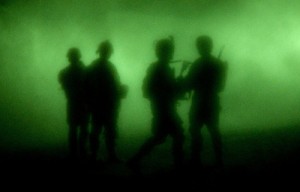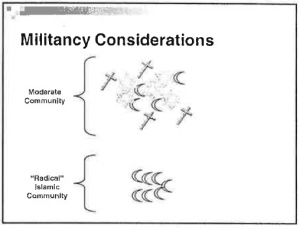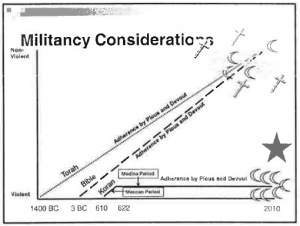What place does this sound like?
Ruling elites … do not see climate change as an immediate threat to their authority. They therefore feel free to take an opportunistic attitude toward climate change, supporting climate change mitigation policies that have collateral economic or political benefits to their particular interests.
Though it could be, it is not an indictment of our own country’s refusal to do anything about climate change. Rather, it’s one of a series of climate change studies and conferences the National Intelligence Council contracted to have done. This one describes the self-serving actions of the pre-Arab Spring authoritarian elite of North Africa.
As Steven Aftergood reported, the CIA is hiding the climate change analysis they’re doing. They just rejected a FOIA for their climate change reports based on a claim that everything they have done is classified. So these reports, prominently labeled, “This paper does not represent US Government views,” are one of the only public reads about what the intelligence community is doing with climate change.
Those contractor studies are interesting for several reasons. First, check out how they define their regions:
- China
- India
- Russia
- Southeast Asia and Pacific Islands
- North Africa
- Mexico, the Caribbean, and Central America
The impact of climate change on the US, Europe, much of the Middle East, and most of Africa are all missing (or, at least, not public).
Shouldn’t someone (not the CIA, which can’t, but perhaps DOE) start thinking about how climate change will affect security in the US? How do you rationalize not including the Middle East (where water is already is source of conflict between Israel and its neighbors) or the Horn of Africa (where climate-related issues discussed in the North Africa studies have presented predictably catastrophic problems in countries that already pose other national security challenges to the US)? Why study India rather than South Asia as a whole, particularly given that Bangladesh will be one of the most impacted countries and (as reflected in the India report) will present India with a serious refugee problem. In short, there are real, critical gaps in the way the intelligence community at least publicly thinks of the potential impact of climate change.
I checked out the North Africa reports (commissioned report, conference report) to see how the intelligence community viewed the region two years before the Arab Spring. True, these reports analyze the impact of things like drought on agriculture and the impact of that on stability, but such analysis largely parallels the impact of neoliberal economic policies on agriculture and therefore on stability. Here’s what the NIC was hearing about climate change and Ag and stability two years before the Arab Spring (these quotes come from the conference report):
An acute state failure to address climate change that results in intolerable conditions for significant segments of the population may constitute a sociopolitical tipping point, in essence a breaking of the social compact between North African states and civil society. At that point, civil actors may determine that fundamental systemic change is necessary. The results of such a situation will depend on the specific reactions by state elites and by the public; reform, repression, or revolution are all possibilities. A combination of climatic stress and inadequate state responses over the next two decades could prove the catalyst for a major sociopolitical shift in North Africa. On the other hand, North Africans tend to hold a religiously based view that “what will be, will be.” Owing to this fatalistic mindset, North Africans are unlikely to blame the state for climate related stresses, making it more difficult to attain the aforementioned tipping point.
Much later, the report predicts that the ancillary effects of climate change will be the cause of social stress.
The implications of climate change in North Africa—notably migration, stress on both rural and urban areas, unemployment, and increased resource competition—are likely to generate volatile sociopolitical conditions that will pose significant threats to the existing political structure. The responses of North African states to these threats may be more decisive for the fate of the region than their direct responses to climate change impacts. North African states have robust capacity to maintain social control in the face of domestic challenges and destabilization. Regimes depend on a combination of entrenched patronage systems, robust mukhabarat (security) apparatuses, and the support of external allies—a combination that has proven highly effective at maintaining political control. They have a track record of effectively suppressing dissent and unrest or remaining resilient where unrest has persisted, such as the civil conflict in Algeria.
States in the region may seek to suppress or distort information on climate change-related challenges. They seek to control access to any information that could provide a basis for opposition to the state, even information as seemingly innocuous as census data. The proliferation of new media and alternative information sources, however, will make it difficult to maintain such censorship. [my emphasis]
Particularly given our own IC’s failure to take the warnings of unrest expressed via social media social media seriously, I find the warning that North African regimes would find it hard to censor this social unrest prescient.
And I find it richly ironic that the IC notes other countries would “seek to suppress or distort information on climate change-related challenges” when the CIA is doing just that in the US.
But I also find the description of these regimes’ reliance on their allies chilling. This report always describes these regimes, several of them key allies of ours, as badly repressive regimes.
Although the level of repression varies between states, with Tunisia and Libya the most extreme, and has varied cyclically over time, authoritarian regimes are well entrenched in every state in the region.
The conference report acknowledges that the US focus on terrorism has narrowed its diplomatic focus with these countries, which in turn has strengthened the security apparatuses in the region–precisely the source of the repressive strength of the countries.
Security issues are the primary focus of US relations with North African states. The predominance of security and military concerns has led to disproportionate US engagement with security apparatuses in the region, strengthening regimes in ways that may damage long-term prospects to meet the challenges of climate change. US policy in the region has become even more security-centric as a result of the continuing struggle against radical Islamic terrorism. While terrorism has deepened US security ties with states in the region, it has also narrowed the scope of US engagement, which may not be in the long-term interests of either party.
And then the report incorrectly suggests that the only likely challenge to these regimes if they fail to respond adequately to climate change would be Islamists.
Islamist groups have emerged as the only viable opposition force because they have resisted state cooptation and because the state has blocked other avenues for social mobilization. In addition, they have established a track record of effective humanitarian responses to mudslides, earthquakes, and other natural disasters, often providing immediate medical, shelter, and food aid that are normally the responsibilities of the state. In many cases Islamist groups may fill the void left by inadequate state responses or the weakness of other types of potential civil responders. Moderate Islamist groups could play a constructive role, providing highly visible humanitarian assistance that empowers autonomous civil actors and contrasts with ineffectual state responses, thus pressuring state actors to respond more effectively. Moderate Islamists could use the climate change mitigation issue to bolster their argument that existing North African governments are illegitimate and exploitative, creating momentum for political reform.
On the other hand, Islamic extremists across the region may exploit climate change’s destabilizing impacts and ineffective state responses to promote the spread of militancy and anti-regime violence. Indeed, Islamist militants could point to climate-induced catastrophes as evidence of God’s wrath against “apostate regimes” whose un-Islamic behavior has plunged the region into desperate circumstances.
In other words, while the report doesn’t lay out the the logical case it makes explicitly, it nevertheless argues that:
- The repressive nature of these regimes may make them less likely to respond adequately to climate change
- Our single-minded focus on terrorism tends to make these countries even more repressive
- If these countries don’t respond to climate change, it may provide an opportunity for precisely the Islamists our single-minded counter-terrorism focus is designed to combat
In other words, this conference report suggests (though does not say so explicitly, perhaps because it was written by contractors intent on getting paid) that in the presence of a stress like climate change, our counter-terrorism approach may be self-defeating.
Now, again, this report wasn’t written by our spooks and it “does not represent US Government views.” Our policy makers may not agree with this report’s analysis, or they may be ignoring it (seeing no “collateral political or economic benefits to their particular interests”). And if you buy my premise that the stress of climate change is similar to the stress caused by an embrace of neoliberalism, then the report badly underestimated both the success of those challenging these regimes and the centrality of Islamists in these countries.
There’s a lot else that could be said about these reports (such as their too-narrow focus on the Ag in each particular country, when recent food price shocks make it clear such stress will play out at broader levels).
But more generally, the report suggests that our counterterrorism policies are making countries around the world less resilient to climate change (and so presumably to a range of other stresses as well).



